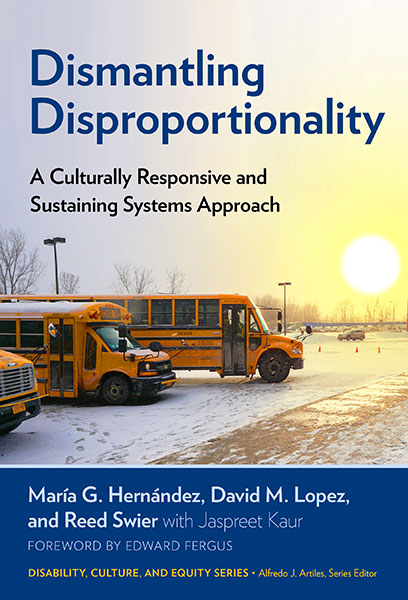Professors: Request an Exam Copy
Print copies available for US orders only. For orders outside the US, see our international distributors.
María G. Hernández, David M. Lopez, Reed Swier
With: Jaspreet Kaur
Foreword by: Edward Fergus
Publication Date: November 25, 2022
Pages: 192
Series: Disability, Culture, and Equity Series

This book positions disproportionality as not solely a special education issue but, rather, a broader issue of educational inequality. Disproportionality in special education parallels a persistent history of chronic socioeconomic and racial inequalities relating to the country’s history of denying educational opportunities to students of color, multilingual students, students with disabilities, and those at the intersections of these identities. This book draws on the authors’ experiences as technical assistance providers with the Center for Disproportionality, coupled with the latest research findings on the causes of racial disproportionality in general and special education. Dismantling Disproportionality examines four district case studies, showing how each progresses from theory to practice in delivering educational services to all students. The authors conclude that the most effective way to address disproportionality is to use a culturally responsive educational systems approach that critically engages practitioners at the intersection of beliefs, policies, procedures, and practices.
Book Features:
María G. Hernández for over a decade has coached pre-K–12 educators in developing culturally responsive education systems that address disproportionality and equity by providing technical assistance and training, and developing evidence-based solutions. David M. Lopez delivers technical assistance (TA) and expert consultation, develops research and evidence-based tools and resources, and provides research and policy support to state education agencies, district leaders, and school-based educators, focused on creating culturally responsive and equitable systems. Reed Swier is a former elementary teacher and administrator and brings this experience with him as he trains educators and works with district leaders to foster more culturally responsive and sustaining school environments.
“Education practitioners looking for long-term, sustainable solutions that seek to change not only the academic outcomes but also the lived experiences of marginalized students and families will benefit greatly from this read.”
—Teachers College Record
“The authors embody the spirit of compassion, empathy, critical thinking, and educational thought necessary in addressing disproportionality. You’ll be able to experience in this book a conversation on the journey on which school districts embark once identified with patterns of disproportionality…. Take lessons from these district examples and create your own implementation roadmap.”
—From the Foreword by Edward Fergus, Temple University
“In many school districts throughout the US, the disproportionate placement of children of color in special education classes is widespread, and too often, accepted as ‘normal.’ The same children are also more likely than others to be subjected to punitive discipline, often involving suspension and removal from the classroom. In this important new book, the authors draw upon years of research and experience in working with schools to show that these patterns of exclusion can be disrupted, and that classrooms and schools can become more responsive to the needs of children they presently struggle in serving. The message of this book is hopeful and inspiring. It shows us that by reflecting on our actions and holding ourselves accountable, educators can take action to make schools more just and equitable. Our children deserve nothing less.”
—Pedro A. Noguera, Emery Stoops and Joyce King Stoops Dean, USC Rossier School of Education
“It is pivotal that stakeholders in the educational system come to grips with our beliefs and biases and how these contribute to the current structures, systems, and policies that are in place in education. Dismantling Disproportionality makes readers aware of the historical, systemic, and intentional policies of oppression in education and the impact these have upon today’s students, specifically those from Black and Brown communities. The authors emphasize the power of providing space for personal, individual antibias journeys to unfold in order to better support antiracist work occurring at a systemic and leadership level. Additionally, the authors’ interweaving of their own personal experiences with supporting schools in dismantling disproportionality brings to light the successes of infusing culturally responsive practices, as well as the challenges that arise when engaging in the courageous work of shifting racist mindsets and policies. Dismantling Disproportionality is a must-have resource for all educational leaders, regardless of where they and their school and district communities are in the journey of dismantling systems that have produced disproportionate, racialized outcomes for our students.”
—Fatima Morrell, associate superintendent, Buffalo Public Schools
“Dismantling Disproportionality is a truthful, authentic, and practical text with a focus on application and use for school leaders, families, and students. The authors provide solution-based approaches to building and sustaining leadership capacity to this work within small and large schools and educational organizations. They brilliantly integrate traditional, systemic, and culturally responsive research approaches to establish protocols, data collection, and analysis that will be used across a wide range demographic and learning communities.”
—Bilal Polson, principal, Northern Parkway School
Professors: Request an Exam Copy
Print copies available for US orders only. For orders outside the US, see our international distributors.